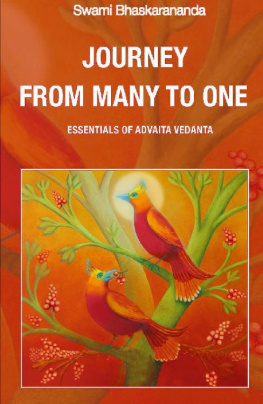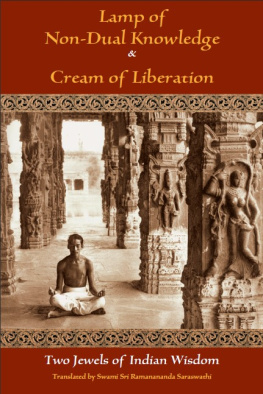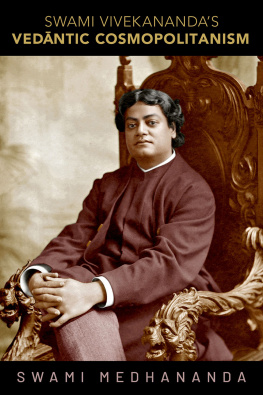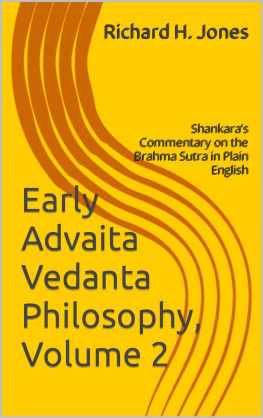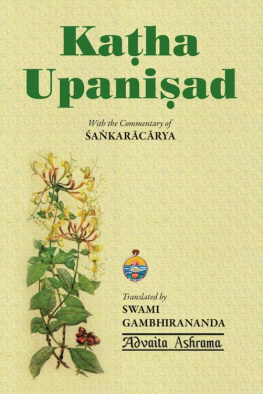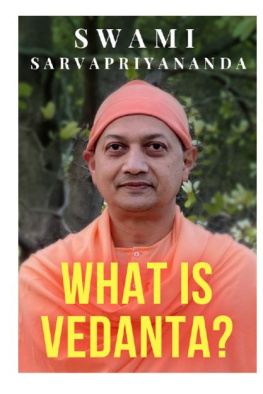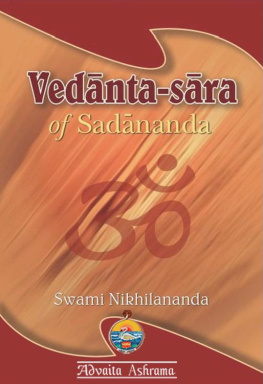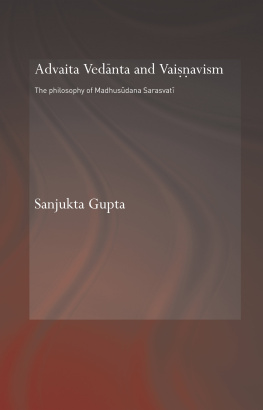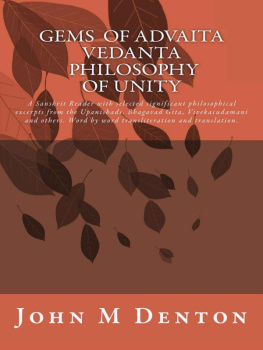Swami Bhaskarananda - Journey from Many to One / Essentials of Advaita Vedanta
Here you can read online Swami Bhaskarananda - Journey from Many to One / Essentials of Advaita Vedanta full text of the book (entire story) in english for free. Download pdf and epub, get meaning, cover and reviews about this ebook. year: 2008, publisher: Viveka Press, genre: Religion. Description of the work, (preface) as well as reviews are available. Best literature library LitArk.com created for fans of good reading and offers a wide selection of genres:
Romance novel
Science fiction
Adventure
Detective
Science
History
Home and family
Prose
Art
Politics
Computer
Non-fiction
Religion
Business
Children
Humor
Choose a favorite category and find really read worthwhile books. Enjoy immersion in the world of imagination, feel the emotions of the characters or learn something new for yourself, make an fascinating discovery.
- Book:Journey from Many to One / Essentials of Advaita Vedanta
- Author:
- Publisher:Viveka Press
- Genre:
- Year:2008
- Rating:4 / 5
- Favourites:Add to favourites
- Your mark:
- 80
- 1
- 2
- 3
- 4
- 5
Journey from Many to One / Essentials of Advaita Vedanta: summary, description and annotation
We offer to read an annotation, description, summary or preface (depends on what the author of the book "Journey from Many to One / Essentials of Advaita Vedanta" wrote himself). If you haven't found the necessary information about the book — write in the comments, we will try to find it.
Journey from Many to One / Essentials of Advaita Vedanta — read online for free the complete book (whole text) full work
Below is the text of the book, divided by pages. System saving the place of the last page read, allows you to conveniently read the book "Journey from Many to One / Essentials of Advaita Vedanta" online for free, without having to search again every time where you left off. Put a bookmark, and you can go to the page where you finished reading at any time.
Font size:
Interval:
Bookmark:

JOURNEY FROM
MANY TO ONE
Essentials of Advaita Vedanta
by
Swami Bhaskarananda
Viveka Press

Seattle
Viveka Press, Seattle 98102
2009 by The Vedanta Society of Western Washington
All rights reserved. No part of this book may be reproduced or transmitted in any form or by any means, electronic or mechanical, including photocopying, recording, or by any information storage and retrieval system, without the written permission of the publisher, except where permitted by law.
For more information write to:
Viveka Press
2716 Broadway Avenue East
Seattle, WA 98102-3909 USA
Phone: (206) 323-1228
Email: vivekapress@vedanta-seattle.org
http://www.vedanta-seattle.org/
Published 2009
Printed in the United States of America
Publishers Cataloging-in-Publication
(Provided by Quality Books, Inc.)
Bhaskarananda, Swami.
Journey from many to one : essentials of Advaita
Vedanta / by Swami Bhaskarananda.
p. cm.
Includes bibliographical references and index.
LCCN 2008923587
ISBN-13: 978-1-884852-12-1
ISBN-10: 1-884852-12-2
1. Advaita. I. Title.
B132.A3B43 2009 181'.482
QBI08-600114
Dedicated to those who are
searching for the ultimate truth.
ABOUT THE COVER
The picture on the front cover was painted by Mrs. Mira Guerquin of Bellevue, Washington, U.S.A. The inspiration for this painting is the following imagery taken from the Mundaka Upanishad , one of the main scriptures related to Advaita Vednta . Through this beautiful analogy the Upanishad tries to explain how the Jvtman (the apparent self) becomes one with the Paramtman (the real self or Brahman ):
The Jvtman and the Paramtman are like two identical birds of beautiful plumage, always united and known by the same name and clinging closely to the same tree (same body). One of them (the Jvtman ) eats the trees sweet fruits (objects of sense pleasure). At first the objects of sense pleasure seem to be sweet and enjoyable, but eventually they taste terribly bitter. The other bird (the Paramtman ) looks on without eating (like a witness, totally disinterested in worldly pleasures).
Seated on the same tree, the Jvtman bird moans (due to its worldly troubles), bewildered by its impotence (helplessness). But when it thinks of the Paramtman bird and meditates on how serene it is and how glorious, the Jvtman bird gradually becomes free from grief, as it finally realizes that it has all along been no other than the Paramtman bird. (The suffering of the Jvtman is the result of his feeling of impotence. This impotence is destroyed by his knowledge of unity with the Paramtman . The grief of the Jvtman is the result of his identification with his body-mind-complex.)
Contents
List of Illustrations
Preface
Over the many years of my stay in the United States I have often been requested by my friends and members of our church to write a book on Advaita Vednta. They said to me, Swami, we find most books on Advaita Vednta written by other authors difficult to understand. Why dont you write an easily understandable book on Advaita Vednta ? I have written this book in response to their request.
Many of them, who are from a non-Hindu background, find it hard to accept truths validated mainly by Hindu scriptures such as the Vedas . Others, without any particular religious allegiance, cannot accept truths and religious ideas merely on faith. They can only accept what appeals to their sense of reason.
This book has been written mainly for such readers. I have tried my best to make the book reader-friendly, using mainly reasoning to present the ideas of Advaita Vednta . At the same time I have taken care not to indulge in oversimplification. I have made sure that the readers will not be deprived of the opportunity of becoming acquainted with all the vital aspects of Advaita Vednta .
In the publication of this book the following persons have helped immensely, and I acknowledge their loving assistance with deep gratitude.
Allen R. Freedman, Ph. D., for computer typesetting the manuscript.
Mira Guerquin for designing and illustrating the cover and drawing the picture of Shankarchrya.
Charles Mathias for drawing the pictures of Rmnujchrya and Madhvchrya.
Devra Freedman and Stafford Smith for proofreading and editing.
I shall feel greatly rewarded if this book proves to be helpful to those for whom it is intended.
Swami Bhaskarananda
Pronunciation Guide
Sanskrit words have been carefully and consistently transliterated (according to the chart below) hoping that the correct, or at least close, pronunciation will thus be indicated.
In this book all Sanskrit words, except for the names of persons, have been set in italics.
a is to be pronounced as o in come
is to be pronounced as in star
e is to be pronounced as in bed
i is to be pronounced as in sit
is to be pronounced as in machine
o is to be pronounced as in note
u is to be pronounced as in pull
is to be pronounced as in intrude
ai is to be pronounced as in aisle
au is to be pronounced as ow in now
bh is to be pronounced as in abhor
ch is to be pronounced as in church
chh is an aspirated version of ch
d is to be pronounced as th in thus
dh is to be pronounced as in adhere
g is to be pronounced as in god
gh is to be pronounced as in leghorn
kh is to be pronounced as in inkhorn
p is to be pronounced as in paternal
ph is to be pronounced as f in fine
th is to be pronounced as in thaw
sh is to be pronounced as in shall
Advaita is the highest truth.
Sr Rmakrishna (1836 1886)

INTRODUCTION
Philosophers do not take anything for granted
Once Bernard Mannes Baruch (1870 1965), economic advisor to the US Presidents Woodrow Wilson and Franklin D. Roosevelt, said, Im not smart. I try to observe. Millions saw the apple fall, but Newton was the one to ask why. In other words, most people are only passive observers; they take things for granted. They dont think deeply or ask probing questions. But there are a few people who do. Newton was one of them. His questioning led to the discovery of what we know today as the laws of gravitation. It is this inquiring mind of Newton that made him a scientist. Had he belonged to ancient times he would be called a philosopher.
Unlike most other people, philosophers dont take things for granted. Their inquiring minds use the wordswhy, how, who, which, what, when and whereas indispensable tools to drill through the outer layer of observed facts and arrive at the deeper truth or truths hidden underneath.
The search for unity behind diversity
It is natural for the human mind to try to arrive at one general truth from many particular truths. For example, we see that animals and human beings die, fish die, birds die, plants die, insects die, and so on. These are so many particular truths. From these many particular truths we can arrive at this one general truth: all living beings die. This one general truth expresses all those particular truths.
Discovery of unity behind diversity by Hindu philosophers
In ancient times some Hindu philosophers in India wanted to arrive at a single truth that could explain this manifold creation. A very small number of those thinkers were somehow able to transform their minds into what we may call extraordinary or pure minds. With such minds they were able to know that one truth that explained everything else. They called that truth Brahman .
Font size:
Interval:
Bookmark:
Similar books «Journey from Many to One / Essentials of Advaita Vedanta»
Look at similar books to Journey from Many to One / Essentials of Advaita Vedanta. We have selected literature similar in name and meaning in the hope of providing readers with more options to find new, interesting, not yet read works.
Discussion, reviews of the book Journey from Many to One / Essentials of Advaita Vedanta and just readers' own opinions. Leave your comments, write what you think about the work, its meaning or the main characters. Specify what exactly you liked and what you didn't like, and why you think so.

